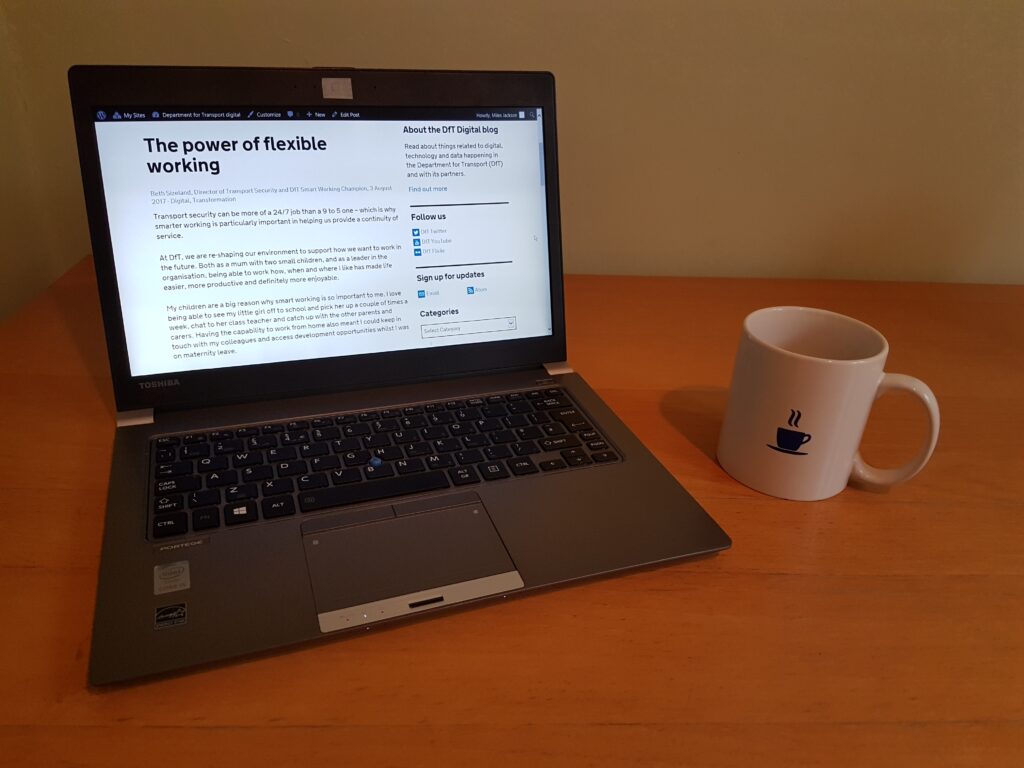
Transport security can be more of a 24/7 job than a 9 to 5 one – which is why smarter working is particularly important in helping us provide a continuity of service.
At DfT, we are re-shaping our environment and working methods to support how we want to work in the future. For example, compared to just a few years ago, we are much better able to work remotely, away from the office. Both as a mum with two small children, and as a leader in the organisation, being able to work how, when and where I like has made life easier, more productive and definitely more enjoyable.
My children are a big reason why smart working is so important to me. I love being able to see my little girl off to school and pick her up a couple of times a week, chat to her class teacher and catch up with the other parents and carers. Having the capability to work from home also meant I could keep in touch with my colleagues and access development opportunities whilst I was on maternity leave.
All of that made a big difference for me, but it’s really important from a business perspective too. In Transport Security, my team has to deal with a wide range of threats and incidents. So people sometimes assume that we therefore need to be in the office 12 hours a day - particularly during crises.
Not making a drama out of a crisis
But in fact our communications equipment and support mean that most of the time we can run out-of-hours crisis responses remotely with people doing shifts from home. This makes us more efficient and responsive, but also enables us to carry on doing what we need and want to outside of work. For me personally it means I can do what would otherwise be an unmanageable job with caring responsibilities. And because of this flexibility, I’ve found that we can attract a much broader talent base into our security roles.
Changing how we work is exciting but I still have a lot to learn about smart working etiquette and culture. Although I really value working from home, I’m so conditioned into ‘going to work’, I have really had to challenge myself to see the office as a place to collaborate rather than somewhere I go by default between 9am and 5pm.
And for many of us, there’s still something slightly illicit about working away from the office, even though it makes us better at what we do! I really hope that will change over the next few years and that smart working becomes part of our DNA as an organisation
Occupational hazards
Being connected at all times is great, but it’s so important to switch off and protect your home life too - which can be easier said than done with a smartphone sitting on the kitchen table.
Speaking of the dangers of smart working, a few years ago, I remember David Cameron at COBR asking us to dial in the world expert on a particularly bothersome Icelandic volcano. She was working from home and, with impeccable timing, her dog barked every time the PM spoke. Fortunately, he saw the funny side.
I had my own similar mishap early on in my DfT career when my then one year old daughter found my new Blackberry and called my line manager at about 7am on a Sunday. Not the best way to ingratiate yourself with the new boss. I think she’s just about forgiven me!
At its best, smart working gives us the space, personal authority and resources to deliver our objectives whilst enhancing our experience of work and home life. But as leaders, teams and individuals, we’re all going to need to challenge our perceptions and explore the possibilities to really make it work.
Want to be notified when we post new stories on this blog? Sign up for email alerts